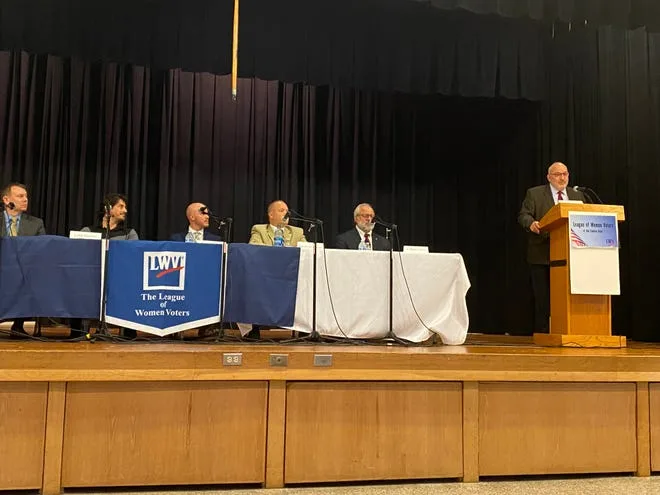
- About 100 people attended the event hosted by the Canton Area League of Women Voters.
- The group recorded video of the event, which will be posted at CantonLWV.org.
- Themes of social justice, economics and prohibition reoccurred throughout the evening.
PLAIN TWP. − A panel of legal, industry and treatment professionals shared their thoughts about Issue 2, the statewide initiative to legalize recreational cannabis, at a public forum Thursday evening.
Most of the panelists shared positive views about the ballot initiative ― saying a regulated market would make drug use safer, expand access to people unable to participate in the state’s medical program, and generate additional tax revenue. The forum ended with wide-ranging questions and answers.
About 100 people attended the event hosted by the Canton Area League of Women Voters (LWV) at Trinity United Church of Christ.
The panelists were J. Dean Carro, a retired professor from the University of Akron School of Law; Tom Haren, spokesman for the Coalition to Legalize Marijuana Like Alcohol and a partner at Frantz Ward LLP in Cleveland; Matt Hisrich, co-owner of Quonset Hut; Keith Hochadel, a Canton Township trustee and clinical counselor; Luke Marino, the owner of Ratio Cannabis in New Philadelphia; and Derek McClowry, a Canton Municipal Court magistrate.
The LWV recorded video of the event, which will be posted at CantonLWV.org.
‘Citizen-driven initiative’
Joseph Martuccio, a retired Canton City Law Director and LWV member, moderated. He opened the discussion with a brief background on cannabis regulation and the matter up for a vote on Nov. 7.
“This is a citizen-driven initiative,” he said.
The Coalition to Regulate Marijuana Like Alcohol proposed the law, which would allow adults 21 and older to buy and possess 2.5 ounces of cannabis and 15 grams of concentrates. They could also grow a maximum of six plants individually and up to 12 in a household with multiple adults.
It’s an initiated statute rather than a constitutional amendment, so the Legislature could change the language. Haren said that was by design since the industry is constantly evolving.
The pros allowing medical marijuana in Ohio
Themes of social justice, economics and prohibition reoccurred throughout the evening. panelists made the case that:
- Issue 2 would be a step toward correcting the damage of prohibition. Haren said that, although cannabis use is about equal among white and Black people, the criminal justice system has disproportionately punished Black Americans. “We view Issue 2 as a justice issue,” he said.
- Hisrich said he’s heard from customers at Quonset Hut about frustrations with the Ohio Medical Marijuana Control Program, which is “fairly restrictive” because of costs and bureaucracy. That leads some people to find an alternative that’s not always as effective or legal. “This is a move in the right direction,” Hisrich said.
- The consensus was that competition could decrease prices across the board. Marino said, in looking at states with medical and recreational markets, medical products tend to be cheaper but with fewer varieties than recreational cannabis. “The prices in general will come down,” he said.
- “It’s also about economics,” Haren said. Issue 2 would establish a 10% tax on cannabis sales in addition to local and state sales taxes. Of that, 36% would go toward a social equity and jobs program, another 36% would go to communities that host dispensaries, 25% would fund addiction treatment and education, and 3% would cover regulatory and administrative costs.
The cons of allowing medical marijuana in Ohio
- While the potential for research posed by legalization was touted as a benefit, the lack of clinical studies because of marijuana’s federal designation as a Schedule 1 substance was noted. “Most of what we know about marijuana is anecdotal,” Carro said.
- The former law professor also said traffic enforcement officers don’t have a specific test to measure the amount of cannabis in a driver’s system. They likely would have to rely on field sobriety tests until a better option is available. “They’re working on it,” Carro said.
- Hochadel had concerns about how cannabis might affect mental health and didn’t think regulation would slow the “black market” or fentanyl-laced drugs. He said there’s not enough data on cannabis but Issue 2 deserves “reasonable evaluation.” He said, “I do think it’s important that we look at this.”
Reach Kelly at 330-580-8323 or kelly.byer@cantonrep.comOn Twitter: @kbyerREP

